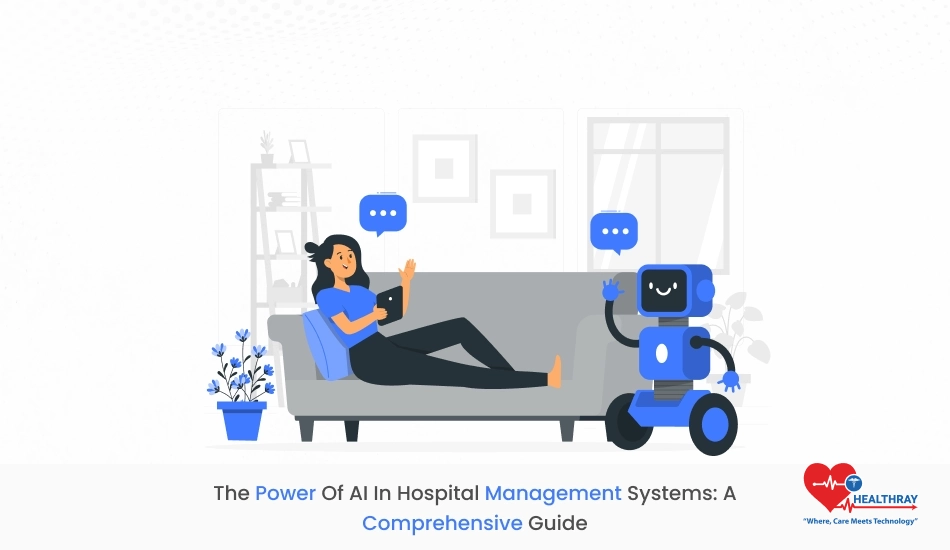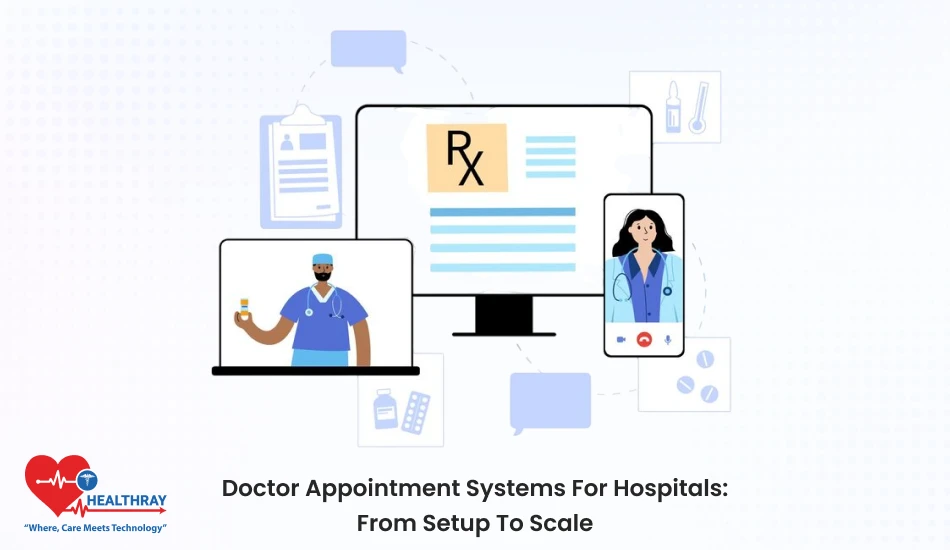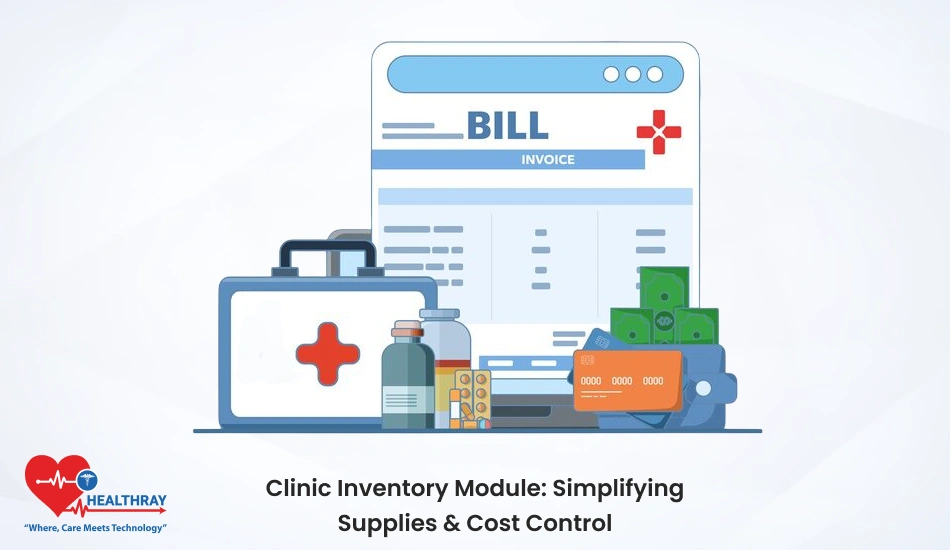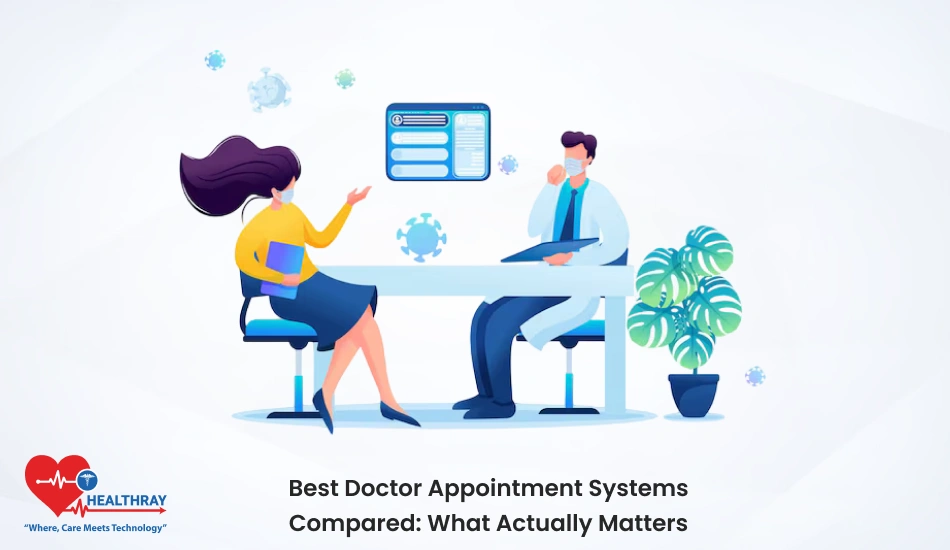Quick Summary
This guide explores the manner in which AI enhances patient care. It brings change in hospital workflow through faster communication, stock management, more effective resource allocation, personalized treatment regimens, and remote monitoring.
Introduction
Artificial Intelligence (AI) is known to find multiple applications in healthcare. It can be used in many applications that are spread across various spectrums in healthcare. One of the best applications of AI in healthcare is hospital management systems. The integration of artificial intelligence is set to transform how a professional can diagnose and cure illnesses in the future.
When you compare big data with artificial intelligence, its usage has led to the development of clinical tools to enhance care, advance medical research, and improve overall efficiency. This integration of AI is necessary as it stands for promising, unparalleled, efficient, accurate, and patient-centric care. This guide will embark you on a new journey to explore the transformative potential of AI in the healthcare sector.
Within this guide, readers will discover multiple AI applications within healthcare systems. By maximizing the predictive capabilities of AI algorithms, hospitals can cater to patient needs. They can use it to quickly identify potential risks and tailor treatment plans with ultimate precision.
Moreover, this guide delves into ethical considerations, regulatory compliance frameworks, and implementation challenges in integrating AI into hospital management software. As AI continues to revolutionize the healthcare industry, this guide will be your companion in understanding the power of AI in hospital management systems. Keep reading!
Understanding the hospital management system
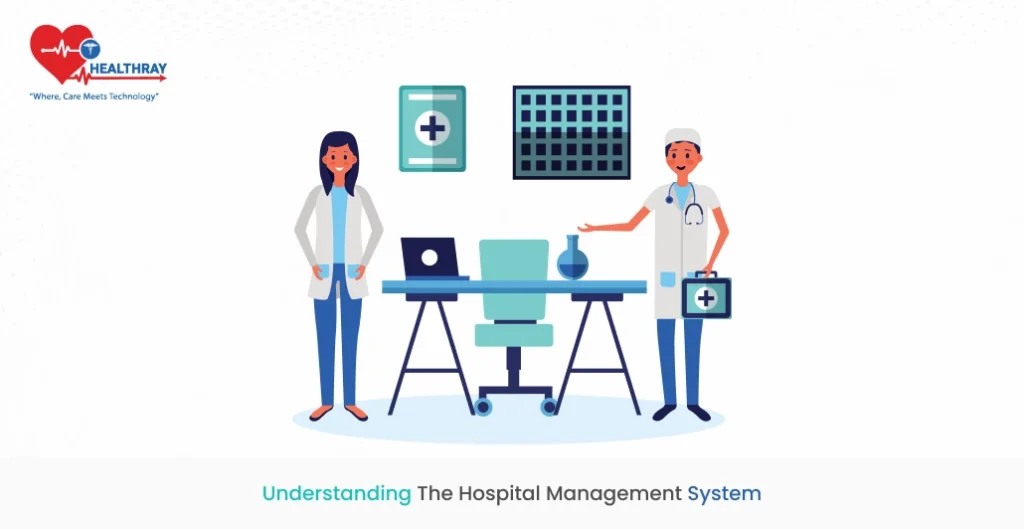
If hospitals want to operate smoothly while ensuring all processes occur timely and patients receive excellent care, it’s necessary to involve technology. With the right technology, a healthcare expert medical facility can do it all. Hence, this is where the hospital management system comes into the picture.
A hospital management system, i.e., HMS, is a software solution responsible for helping hospitals and medical care facilities manage their operations. In all, it’s an integrated solution that can help manage the resources of hospitals and functions more effectively. It also integrates various hospital departments into a single network.
The most commonly used software in healthcare is electronic health records and electronic medical records. These medical software help manage patient data and medical history along with treatment data. The hospital management system is increasingly employing technology to streamline operations.
One of the most crucial things about hospital management software is that it constantly keeps evolving with time to overcome challenges. Currently, most hospitals and healthcare institutions use advanced hospital management systems to keep track of patients and employees.
This software helps keep all the patient records up to date and compliant with rules and regulations. It eliminates the need for staff to undertake manual entry and paperwork and provides accurate filing. Additionally, introducing AI into HMS is a great idea.
Step towards digital era with our healthcare solution
Revamp your hospital facilities and embrace change for better healthcare management. Ease in managing and organizing large medical datasets leads to effective analysis. Seize the opportunity now!
How does AI-powered hospital management software enhance patient care?
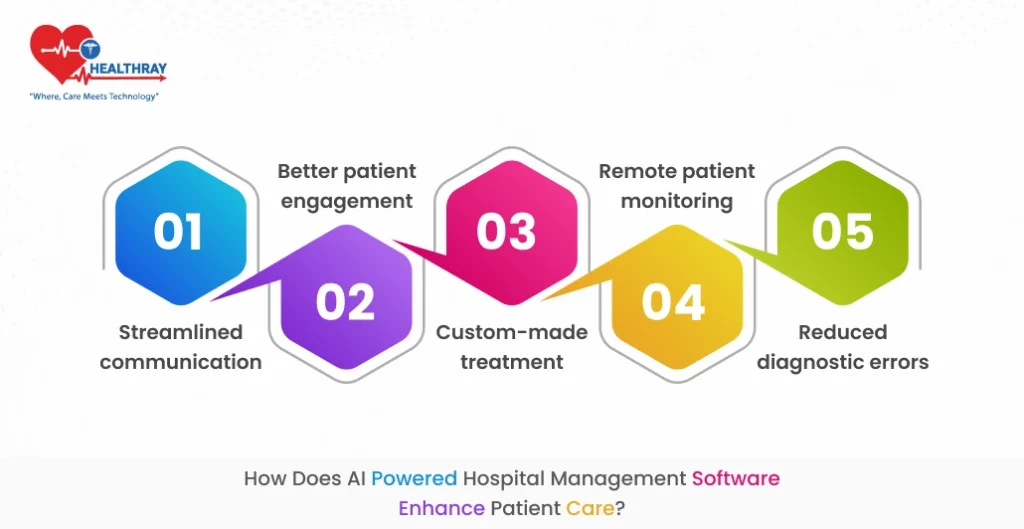
Streamlined communication
AI-powered hospital management systems revolutionize patient care by facilitating straightforward communication. With the help of AI-based algorithms, it can collect patient data effectively, analyze it and share that data among professionals in real-time. Hence, it will further enable seamless communication between departments, ensuring that critical information is accessible to those who need it.
Additionally, by introducing automation to daily administrative tasks such as appointment scheduling and documentation, AI can lessen the stress on the staff. The HIMS software eventually allows more time for better patient care.
Moreover, AI-driven predictive analysis can help cater to patient needs and complications. Hence facilitating early intervention and personalized treatment plans. It enhances the patient’s treatment outcomes and improves their overall experience by reducing wait time. Also, optimal resource allocation is possible with the proper communication among teams. Additionally, chatbots driven by AI and virtual assistants can support patients anytime. The HIMS system helps address their queries, provide educational resources and offer reminders.
Hence, AI-powered hospital management systems can transform patients’ careers by providing better communication, a great workflow, and care. All of this ultimately adds to patient satisfaction.
Better patient engagement
AI-powered hospital management systems are known to significantly enhance patient care with the help of better patient engagement. With the help of AI algorithms, hospitals can create their communication and interactions with patients to satisfy their needs and demands as per their preferences. Hence, this customization provides a more profound connection among patients and medical industry professionals. It leads to increased patient satisfaction and adherence to treatment plans.
One manner in which AI adds to patient engagement is with the help of personalized treatment decisions based on individual health data and historical data. AI algorithms can help analyze patient data in real-time to provide treatment according to medication adherence, lifestyle factors, and preventive care parameters.The hospital information management system empowers patients to look after their health and promotes behaviours.
Also, AI-powered virtual assistants and chatbots can provide convenient paths for their patients to get healthcare services and information. These tools tend to enhance patient convenience and accessibility. It does so by answering inquiries, scheduling appointments online, and providing instructions for follow-up care. A hospital queue management system that leverages AI fosters better patient engagement through personalized recommendations and convenient communication channels. It empowers patients to take an active part in their healthcare journey.
Custom-made treatment
AI-powered hospital management systems enhance patient care by providing customized treatment plans for an individual’s needs. With the help of vast data analysis and ML algorithms, AI can go through a massive amount of data, including medical history, genetic data and treatment outcomes. The hospital management information system helps medical experts know patterns, forecast health risks, and choose personalized treatment options. By making the most of AI, healthcare providers can optimize treatment plans.
They utilize information like patient demographics, medical history, hereditary information, and patient reactions to distinctive medical treatments. Consequently, having this personalized treatment approach will guarantee more successful and suitable care. They are advanced leading to way better results and less adverse impacts. In addition, AI can be supportive in real-time decision-making by the information administration, making a difference between suppliers recognizing significant bits of knowledge and proposals.
For instance, AI-powered clinical decision support frameworks can review patient information and give the best treatment choices based on the most recent medical evidence and direction. Subsequently, it helps healthcare providers make the right choices rapidly and accurately.
AI-powered hospital management systems are bound to change patient care by empowering personalized treatment that meets special patient needs, inclinations and restorative history. You can have customised approach to patient enrollment will guarantee that each patient gets high-quality care, driving to the best results and improved fulfillment
Remote patient monitoring
AI-powered hospital management software is basically utilized to ease patient care with the offer assistance of remote patient monitoring. It is a transformative approach that helps healthcare suppliers track the wellbeing status of patients outside of the conventional clinical environment.
With the assistance of AI algorithms, hospitals can collect and check patient information in genuine time. Independent of the patient’s area, it empowers proactive intercessions and personalized treatment plans. Remote patient monitoring frameworks that use AI can always screen crucial markers such as heart rate, blood pressure, oxygen levels, etc.
Monitoring all these crucial signs helps healthcare suppliers get cautions expeditiously of any variations from the norm or declining health in a patient. Subsequently, this early location of potential wellbeing issues can incite mediations that dispense with the risk of complications and healing center readmissions.
Additionally, AI-fueled remote patient monitoring frameworks can offer assistance to reflect on patient information over time with the offer assistance of patterns and predict future results. It empowers providers to alter treatment plans, optimize patient care and improve healthcare outcomes.
By giving remote patient monitoring improves patient care by giving nonstop checking, convenient conclusions and personalized treatment plans. Consequently, it cultivates way better health results and patient fulfillment.
Reduced diagnostic errors
AI-powered hospital management systems are better for patient care. It can lessen the chances of diagnostic errors with the help of advanced data analysis and machine learning algorithms. Hospitals may employ vast amounts of patient data, medical records, imaging scans, and test results.
Hence, they use AI to assist healthcare workers in diagnosing patients more quickly and accurately. AI algorithms are also responsible for analyzing complex data, going through subtle patterns and providing insights that may not be directly visible to humans.
Consequently, by including AI in hospital management software, hospitals can upgrade the exactness and productivity of diagnosis. It leads to faster treatment start and superior results. AI-powered hospital program devices can also work as second opinion instruments for medical centers, which are important in helping suppliers approve diagnoses and maintain a strategic distance from chances of misdiagnosis. The HMS system may be supportive in complex cases or uncommon maladies where more than skill might be needed.
Overall, AI-powered hospital management systems can improve patient care by dodging diagnostic mistakes, improving demonstrative exactness and driving to more viable treatment plans with great results. This headway in innovation can result in unmatched understanding care over restorative disciplines.
How is an AI-powered hospital management system helpful to healthcare professionals?
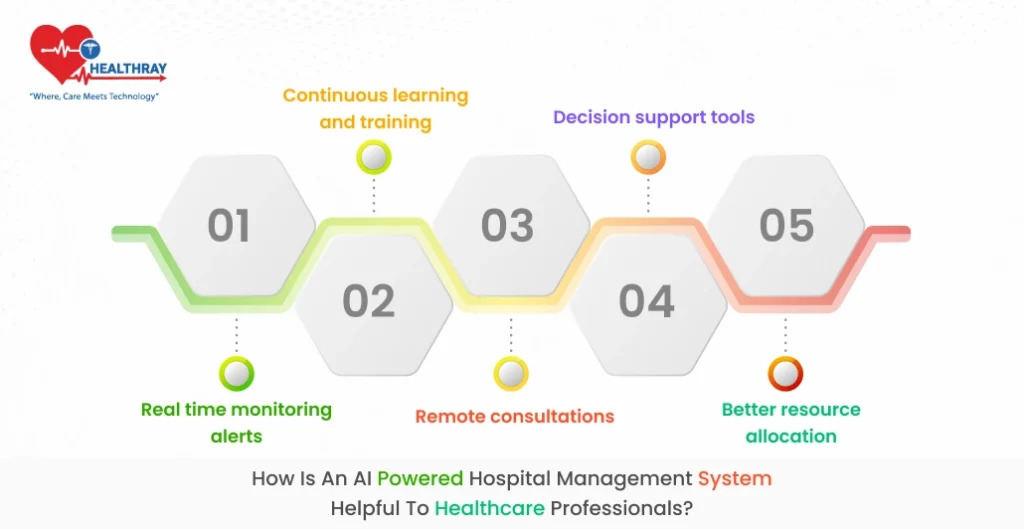
Real-time monitoring and alerts
A Best Hospital Management Software In Healthcare that leverages the advantage of AI gives broad support to healthcare experts with real-time observing and alerts. It helps them change how patient care is administered. With the help of advanced algorithms, these frameworks can always analyze patient information such as the laboratory tests and data, imperative signs and medical history. It helps healthcare experts promptly distinguish any variety from typical parameters and get instant alarms with respect to potential health dangers or declining conditions.
Real-time monitoring and alarms can offer assistance to healthcare experts by giving insights at the right time, making a difference in proactive interventions and alterations in medicines. For instance, if there is a change in a patient’s vitality that demonstrates a sudden weakening, healthcare specialists will instantly get a caution.
It will permit them to conduct treatment easily whereas avoiding any unfavorable impacts. Additionally, AI-powered frameworks can prioritize giving alarms based on seriousness. Subsequently, it guarantees that healthcare suppliers can focus on more urgent situations.
To conclude, hospital management systems that use the control of AI can offer assistance to healthcare experts with real-time checking and cautions. It upgrades their capacity to convey superior care on a timely premise.
Using current healthcare information to avoid future healthcare risks by taking proactive steps. The healthcare software helps to walk through the complete records of patients, making harder and complex healthcare decisions within seconds. Intuitive analytical dashboard creates a bigger impact in analyzing healthcare issues and progress over time. One single second in healthcare can save a life and one second delay also can ruin one’s life.
Besides, this improves patient results and spares lives. This innovation comes forward as a basic progression in the healthcare framework, bringing alter in patient care monitoring in advanced healthcare settings
Continuous learning and training
An AI-powered hospital management system benefits healthcare suppliers because of continuous learning and training opportunities. With the help of machine learning and advanced algorithms, these frameworks can analyze the incredible deal of information, clinical guidance and treatment results.
Healthcare experts can make the most of this richness of data to remain updated on the most recent progressions, best practices and treatment protocols.
Moreover, an AI-powered hospital and practice management software system can help experts with personalized learning proposals.
These proposals are based on healthcare professionals’ specialization, encounter level, and learning destinations. Thus, this targeted approach will guarantee that healthcare experts get all relatable and noteworthy information that includes their clinical skills and decision-making abilities.
AI can simulate different clinical scenarios and give virtual preparation modules that help healthcare experts in making their diagnostic and treatment abilities more advanced and with lesser hazard. Thus, this continuous learning capacity not only moves forward competency but moreover upgrades the certainty of healthcare experts. It too guarantees they stay agile and versatile in these advancing healthcare challenges. The healthcare software helps experts remain side by side of the most recent information, refine their ability and convey the best quality care.
Remote consultations
Along with patients, an AI-powered hospital management system is too useful for healthcare specialists due to its remote monitoring. By including AI capabilities to telemedicine, these frameworks help experts conduct virtual discussions with patients independent of location. Subsequently, it helps overcome geological boundaries and improve accessibility to the best quality care.
Remote consultations give medical specialists the opportunity to interface with patients anytime. This capacity is more profitable in cases where it is not viable to have in-person patient visits, like a pandemic or portability limitations.
Moreover, these systems can provide:
- Remote monitoring and consultations.
- Secure communication channels.
- Video conferencing capacities.
- Easier access to patient health records.
With the help of electronic health records, an expert can also see symptomatic information in real time. It permits experts to conduct in-depth evaluations, grant the patient portal right medical advice, endorse medicine and screen patient progress remotely.
Create assorted ways to communicate with patients and share medical information. With the healthcare management system, streamlining to engage with them and easier for patients to receive medical services. AI provides advanced facilities such as automated booking appointments and extract any of your prescriptions with one single text.
In all, remote consultations empower healthcare experts to provide timely and helpful patient care. The hospital software solutions, more invaluable for specialists who are physically unavailable but required to treat their patients online. Subsequently, it in the long run takes patient care to the next level and optimizes workflow. This innovation is a helpful progression in the healthcare conveyance system. It moreover upgrades patient-provider communication, which eventually progresses patient results.
Decision support tools
A hospital management system that AI drives can revolutionize the decision-making process of healthcare professionals by leveraging awesome decision-support tools. These tools benefit from advanced algorithms and machine learning capacities for analyzing patient information, medical writing, and clinical rules.
Subsequently, an expert can create personalized proposals based on individual needs. Healthcare experts can improve symptomatic precision by integrating AI-powered decision support tools. The hospital software can also help recognize potential treatment choices and prioritize interventions effectively.
These devices help hospitals analyze complex conditions, give ideal treatment plans, oversee appointments and guarantee the patient gets the best care. Moreover, AI-driven decision support devices give experiences into clinical care and assist experts in resource assignment, budgetary management and operational planning.
With the help of predictive analytics and precise experiences, these devices help hospitals optimize workflow, improve productivity, and include overall performance and cost-effectiveness.
Hence, in all, AI-driven decision support tools permit healthcare experts to make the best, most educated and most precise choices based on evidence. It eventually leads to improved patient results, better quality care, and more prominent operational productivity in the healthcare industry.
Better resource allocation
An AI-powered hospital management system is valuable for healthcare professionals because it provides great resource allocation abilities. With the help of sophisticated algorithms and data analytics, these systems can go through a huge amount of factors, such as demographics, clinical needs, and staffing levels, that optimize resource allocation.
By integrating AI-driven tools, healthcare professionals streamline operations, give responsibility to the staff more accurately and ensure resources are used correctly.These can further lead to reduced wait times, enhanced access to care and improved overall patient satisfaction. Moreover, an advanced hospital management system can offer predictive analytic capabilities that can help forecast the demands of patients in the future, along with resource requirements.
It allows healthcare organizations and facilities to adjust staff levels, inventory, and other resources proactively. With hospital software systems, minimizing bottlenecks and providing smooth operations. These AI-driven systems can recognize the areas of inefficiency within the healthcare sector.
Hence, the hospital quality management system helps physicians implement targeted improvements along with cost savings. Resource optimization enables providers to deliver maximum results and effective healthcare.
Try the AI-powered hospital management system from Healthray for the best patient outcomes!
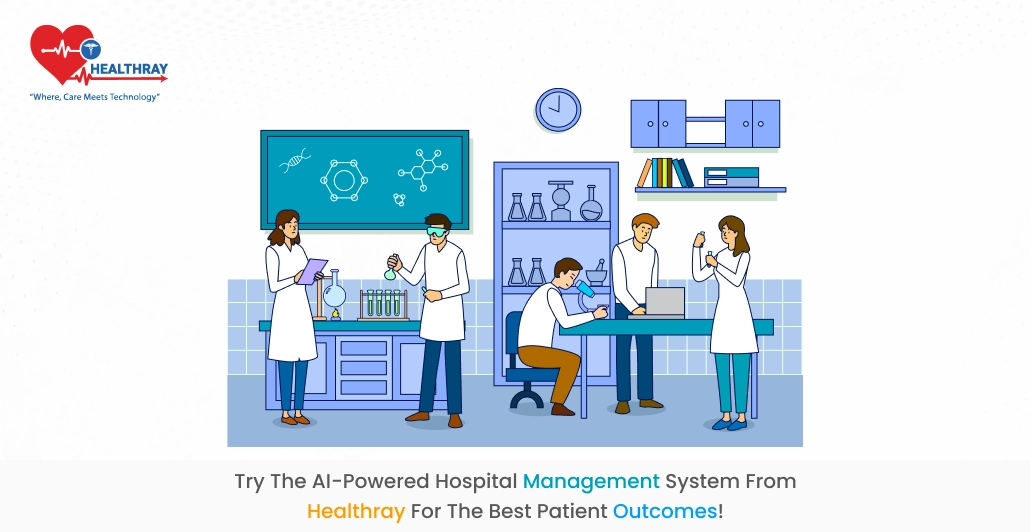
Are you looking to experience unparalleled patient care along with fabulous operational efficiency? Healthray’s AI-powered hospital management systems are an ideal choice. We mix cutting-edge innovation at the front of healthcare innovation to change how hospitals work and convey care.
Using Healthray’s AI-powered hospital management system, these hospitals can see after each aspect of patient care. The hospital software incorporates everything from scheduling appointments and medical bills to tracking the results of treatments. Real-time monitoring and predictive analytics permit healthcare experts to identify wellbeing issues effectively.
Our decision support tools enable healthcare specialists with significant insights, improve diagnostic exactness and direct clinical decisions. Hospitals can streamline workflow, guarantee appropriate asset allotment, and improve productivity by making the most of the AI algorithms. Consequently, Healthray’s AI-powered HMS gives superior patient fulfillment and outcomes.
Stop settling for those obsolete frameworks these days when you have extraordinary choices like Healthray!
Upgrade the execution of your hospital with the best conceivable care. Encounter the future of healthcare nowadays and know what difference AI can make in getting the best patient results.
Conclusion
This guide sheds light on the transformative potential of AI in the hospital management system. Through this content, we went through different applications of AI, counting streamlined workflow, way better communication and personalized treatment plans. Also, remote patient monitoring capabilities have a significant part in improving patient care and operational productivity.
By making the most of AI advances, hospitals can guarantee critical resource allotment, move forward the precision for diagnosis and empower healthcare experts. Also, leveraging the help of decision support devices can cater to personal needs. Besides, AI-powered devices can open entryways for nonstop learning that advances ongoing education with way better training opportunities.
As we move towards the future of healthcare, it becomes essential that AI-powered hospital management systems are not only tools but moreover accomplices with the medical workforce in conveying extraordinary care. By going through the experiences and techniques in the guide, healthcare experts can open the potential of AI to make greatness in healthcare conveyance.
